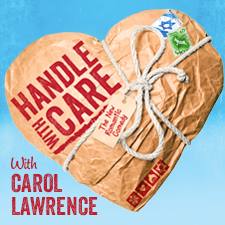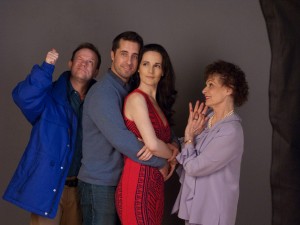Interview: Fred Schepisi of “Words and Pictures”
Posted on June 3, 2014 at 8:00 am
Fred Schepisi is a soft spoken Australian director whose films include “Roxanne,” the charming update of “Cyrano de Bergerac” starring Steve Martin, and the thoughtful drama about connection and disconnection, “Six Degrees of Separation,” starring Will Smith. His new movie is an endearing romance called “Words and Pictures,” starring Clive Owen and Juliette Binoche as teachers in a posh prep school. He talked to me about the challenges of making a movie for and about grown-ups in a world of multiplex fodder and working with Binoche to bring her real-life skill as a painter to her character, an artist and art teacher.
How do you make a smart and witty grown-up romance in the middle of an audience that’s all about superheroes and explosions?
I guess that world doesn’t interest me all that much.
So it’s a challenge to get the financing?
Absolutely. You have to cobble all the money together actually. Curtis Burch did a extraordinary job on this one and in a way that most people don’t manage these days: just find of a whole group of people in Texas who are interested in quality movies and prepared to help finance it. So for once we kind of had the about half the money from private equity and that makes it easier for you to kind of look around for state rebates and what we refer to as foreign sales, you’ve got a real chance then. It was a credit to the Texas investors to go for it. I certainly hope that we will be able to reward them so they’ll keep going for it. There is a quality market out there. All across Europe there are people wanting to see good material as I think there are everywhere and the second challenge is making sure that you get it told there, get the word out there so that people begin to see quickly; which gives you the chance to last.
There are fewer and fewer outlets in terms of theatrical distribution for good material. So it’s kind of important to let the market know that’s where you are and what it’s about. And I think people are starting to discover that there is a whole generation out there that want good movies and will go out and see them.
And what was it like to work with Juliette Binoche on the art created by her character, who is struggling to adapt to physical limitations from rheumatoid arthritis?
I knew that she had painted in another film; I knew that she painted portraits. I did not know the extent of her talent and experience but I figured that if she had a love of art that would help even if she was faking; Which you know I expected we might have to do, as did the art department.
But it became clear to me very quickly that she is an extremely, diversely talented person and that it would be better if she did it all. So we decided together to go on a journey and certainly it’s very freeing that somebody’s actually painting rather than using a lot of trickery to make it look like they are. But she was prepared to go on the same journey the character has to go on, going from being a portrait painter to finding other ways of expressing herself. A few times we had to shift the schedule around as she hits certain points to give her a little more time to develop that, go further with it and get to a point where she and I both agreed that yes, this is the way to go, these are the artists who should be influencing us and then letting her find her own voice; some of which we actually did live on camera. Sometimes she would reach certain stages so then we would re-create them on camera and it was quite a journey and she was fabulous.
What was that rig that actually she took from another artist, that rig that moves the big brushes around?
We were excited about that because it was exactly right for somebody who’s got rheumatoid arthritis and can’t really hold a brush. It has no weight and just moves with the slightest touch. It’s the perfect thing to explore for that character and also an interesting way to watch somebody paint.
How do you come down between words and arts? Which side are you on on that?
Sometimes either one expresses something that the other can’t and therefore that makes it more powerful. I’m sure you know that when something is really brilliant in a particular media; whether it’s painting or whether it’s words on a page all words on stage, when it’s really brilliant it’s almost impossible to translate to the other media. It has a power of its own. But sometimes the things together have even more power and then there’s music and dance.
When you were growing up what were the movies where you said, “That’s something I’d like to do.” Did you watch a lot of Hollywood movies?
I was very lucky. Somewhere around the age of 14 or 15 I discovered what people referred to as “continental movies” as we call them in Australia. They were European and British movies. I think I went to them for more prurient reasons in the first place. What I found was these wonderful worlds I was transported to; and these wonderful ideas and that’s when I knew that’s what I would like to do.
And it was the 40’s and 50s, for me mostly it was the 50s but you were still seeing movies from the 40’s and then I belonged to film societies and used go also to what was in fact the oldest film festivals in the world, you’d see films from Japan and from Persia and from India and I was always transported about their ideas and the culture and the experience and the surprising thing for me was I always found something myself in them.
You were working with established, experienced actors and with teenagers on this film. Was that a challenge as a director?
A lot of your work is done in the casting, that’s probably the most difficult part and in a way half your job is done if you get that right. And sort of seeing if the chemistry is going to work between people and what it is that makes it work and encouraging that.
Actually all of the kids in the classrooms are from Canada. We tried not to cast the clichéd way. We used the “cultural diversity” approach and just let them be fresh, led them contribute, let them come up with the youthful way of doing thing. It was quite a lot of fun, it really was. And then we were lucky to get Christian Scheider, Roy Scheider’s son, to play Clive Allen’s son. He’s done stage things but that was his first film and he had just the right soul for the part.
What’s next for you?
I’m going to a film called “Olive Sisters,” set in Australia. It’s an Italian family who have come out and farm and grow olives and do their work and face the prejudices of people in the late 50s; prejudices about how they dressed and what the ate, and who they were. And next year, I am pretty confident we’ll be doing the film of the Broadway musical, “The Drowsy Chaperone.”
Oh, I love that show! Please promise to talk to me again when that one comes out.
Will do.



